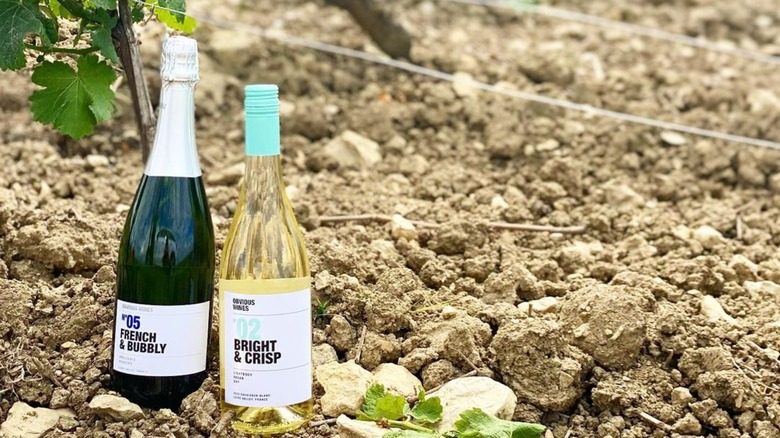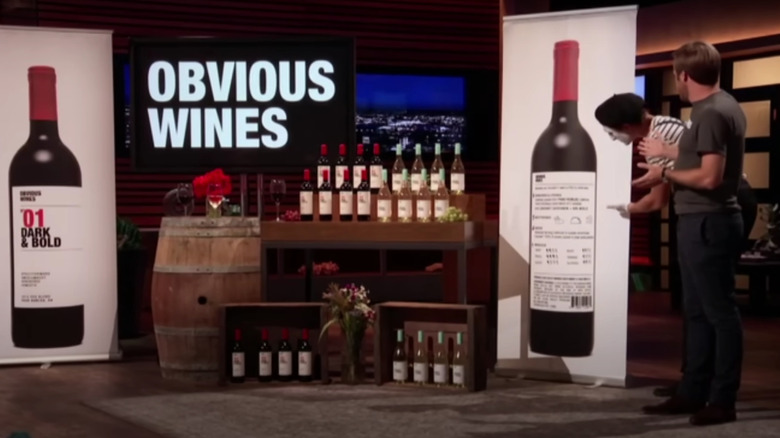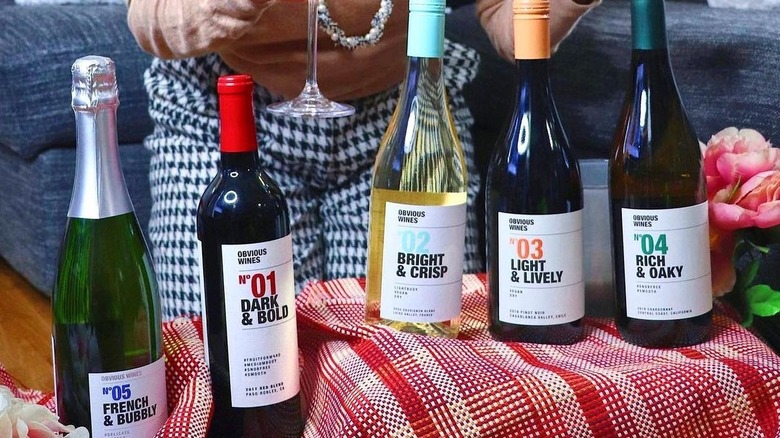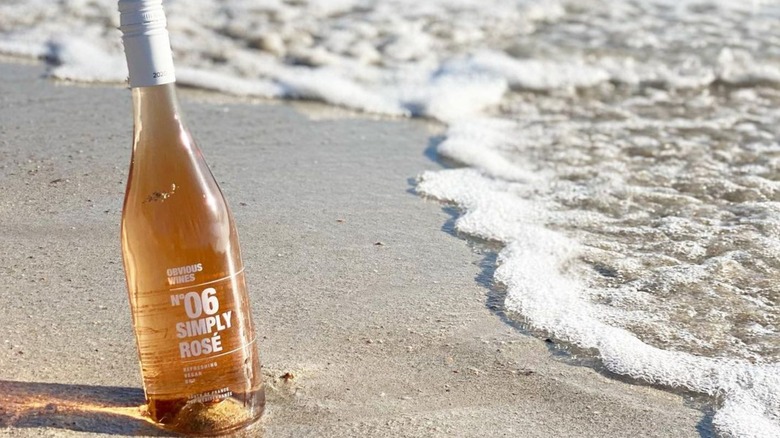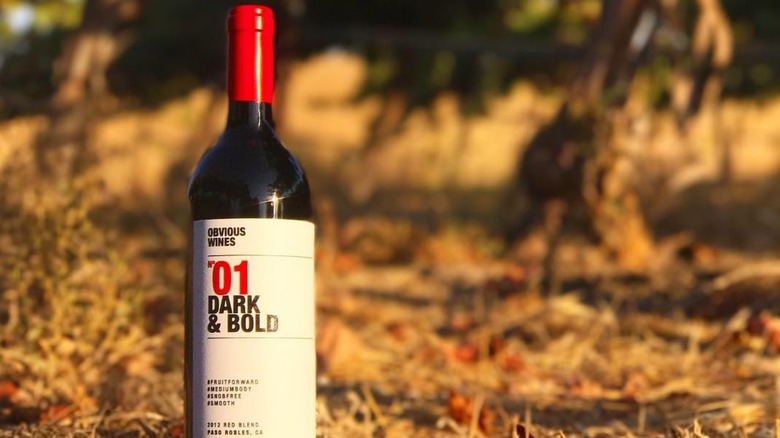Obvious Wines: Here's What Happened After Shark Tank
The world of wine can be an awfully daunting one. A survey commissioned by Woodbridge Wines in 2022 found that of the 2,000 Americans aged 21 and over that participated, nearly three-fourths found the rules that surround wine to be intimidating. While the social etiquette that comes with drinking wine causes much confusion no doubt, the problem begins much earlier — right when it's time to choose which wine to drink. Wine labels use terminology that few non-sommeliers may understand and all those grape varieties, flavor notes, and terroir information can be a lot to unpack even on a good day. This is precisely the problem Obvious Wines' founder Brice Baillie made it his mission to solve.
Baillie walked into season 10 of "Shark Tank" with a business that scrapped all the fancy jargon on a wine label to make picking, drinking, and talking about wine less intimidating. Originally from the Champagne region of France, Baillie moved to the U.S. where he worked in finance with L'Oreal and developed a new taste for American and Californian wines. Despite his legendary hometown, Baillie admitted that he had no educational background in wine. Rather, the idea for Obvious Wines came from his own experience of feeling lost and intimidated by one too many bottles of wine — a feeling that he realized was much too common. And so, Obvious Wine came to be: a collection of delicious wines that swapped obscure words and phrases for clear packaging that described the taste of wine in no more than two simple words.
What happened to Obvious Wines on Shark Tank?
Baillie appeared on "Shark Tank" hoping to secure a $150,000 investment for a 5% stake in his company. At the time, Obvious Wines had four wines on offer: No.1 Dark and Bold, No. 2 Bright and Crisp, No.3 Light and Lovely, and No.5 French and Bubbly. While the back of the label had more detailed descriptors for the more advanced wine drinkers, the front of the bottle had only the name of the wine, which also described its taste. In Baillie's own words, these wines were "snob-free" and didn't require a Ph.D. to drink.
Although the key factor about Obvious Wines was its simplified, easy-to-understand labeling, Baillie recognized that the wines had to have the taste to back them up. While the wines did win over the sharks with their flavor and aroma, it wasn't enough for everyone to make an offer. Kevin O'Leary backed out due to conflict with his own brand of wine whereas Daymond John thought that the key to Obvious Wine's success would be in its brand-building, a mammoth task that he wasn't keen on undertaking.
Lori Greiner, on the other hand, added that despite not being the biggest fan of white wine, the No.2 sauvignon blanc was pretty easy on the tongue, and it was in her that Obvious Wines found its investor. After a series of back-and-forth, Baillie managed to strike a deal with Greiner and walked off with a $160,000 investment in exchange for 12.5% equity — a sizeable uptick from his initial ask.
Obvious Wines after Shark Tank
Although Baillie's goal was to secure $150,000 for a 5% stake in his company, the Obvious Wines founder seemed happy to part with 12.5% equity as the higher stake meant that Greiner would be more invested in the business. His only counter? He wanted the shark to up the investment amount by $20,000 to keep the company's valuation lucrative for investors. While Greiner countered with $160,000 (which Baillie accepted), it seems that Obvious Wines ultimately found a better investment elsewhere instead, and the deal fell through.
Since Obvious Wines' appearance on "Shark Tank," the founder turned toward crowdfunding to raise new investments in 2021. At the time of filming, Obvious Wines was no more than seven months old and had made $100,000 through wholesale. According to the crowdfunding campaign, Obvious Wines' net revenue jumped to a whopping $1.05 million in 2019 and $1.3 million in 2020. As a result, Obvious Wines successfully raised over $223,000 from 172 investors at a $11 million valuation.
While the deal with Greiner may not have worked out, Baillie told The Argonaut that "Shark Tank" did wonders for Obvious Wines' exposure and that they continued to receive emails for months from fans. Coupled with crowdfunding, Obvious Wines, it seems, is not only still in business but has managed to expand and continues to thrive.
Is Obvious Wines still in business?
When Baillie pitched his business to the sharks, Obvious Wines was only available in 100 locations limited to mostly California. According to Baillie, the way to get bigger and reach retailers on a larger scale was to show them a success story of Obvious Wines' popularity in Southern California. As it turns out, the founder's strategy may have worked because Obvious Wines has since expanded into several states across the country.
According to the company's website, Obvious Wines is available in 178 stores in California alone as well as in 78 stores in Texas, 126 stores in Florida, 70 stores in New York, and at several locations in Tennessee and North and South Carolina. Obvious Wines also ships online orders to over three dozen states in the U.S.
Extending its geographical presence and delivery reach aside, Obvious Wines has also expanded its range of simplified wines. The wines now include a No.4 Rich and Oaky Chardonnay as well as a No.6 Simply Rosé, which snagged the best sustainable rosé title at Cosmo's Wine Awards in 2021. While the "snob-free" wines were priced at $16 when they appeared on "Shark Tank," the price tag of Obvious Wines' liquor has gone up to $19 since — with the exception of the No.5 French and Bubbly, which goes for $28 — and any seasonal ventures, like the Après Sol ($25).
What's next for Obvious Wines?
Obvious Wines launched a lifetime of wine deal in 2022 that charges a one-time fee of $6,000 for a lifetime delivery of four bottles of wine per month. Generously admitting that "it is a really bad deal for us" especially considering the inflation, the website promises that subscribers will break even on their sizeable investment in just seven years — after which all wine deliveries will essentially be free. While the deal could just be a quick cash grab to keep money flowing through the business, if the lifetime subscription is any indication, Obvious Wines plans to stick around for a very long time.
Considering the fact that Obvious Wines has already launched new wines and expanded to several states beyond California since "Shark Tank," there may very well be more varieties added to its existing collection and expansion to even more areas in the future. Obvious Wines also launched a sparkling Italian rosé named Après Sol for the holidays in 2022, meaning new, seasonal bottles of celebration bubbly may very well be on the cards in the years to come.
With a following of nearly 9,000 people on Instagram, Obvious Wines has a solid social media presence and keeps its fans updated with new launches and appearances at trade shows and wine feasts across the country. Whether or not their lifetime of wine deal may actually be worth it remains to be seen, but what is certain is that Obvious Wines has made quite the name for itself, despite not following through on the deal with Greiner.

